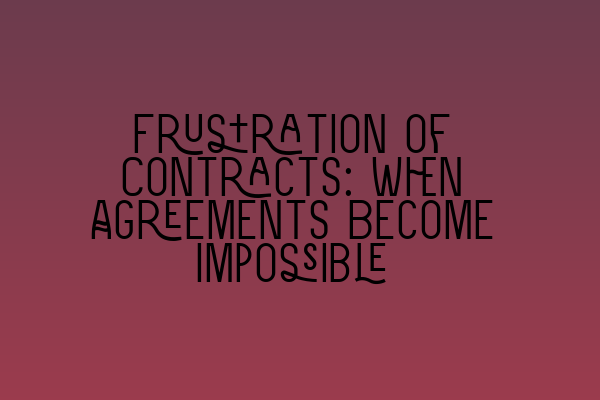Frustration of Contracts: When Agreements Become Impossible
Contracts are the backbone of any business transaction or legal agreement. They establish the rights and obligations of the parties involved, providing stability and certainty. However, there are times when unforeseen circumstances arise, making it impossible for parties to fulfill their contractual obligations. When this happens, frustration of contracts comes into play.
In this article, we will explore the concept of frustration of contracts, why it occurs, and its implications in the legal sphere. We will also discuss some key cases that have shaped the understanding of frustration in contract law.
What is Frustration of Contracts?
Frustration of contracts occurs when an unforeseen event or change in circumstances renders the performance of a contract impossible, illegal, or radically different from what was initially agreed upon. These events are typically outside the control of the parties involved and could not have been reasonably anticipated.
Common examples of events that can lead to frustration include natural disasters, wars, government regulations, and the outbreak of a pandemic. In such cases, the purpose of the contract is frustrated, making it unfair or impossible to require performance.
Implications in Contract Law
When a contract becomes frustrated, it has far-reaching implications for both parties involved. Frustration operates to automatically discharge the contractual obligations, relieving the parties from further performance. However, it does not erase the rights and liabilities that have already accrued before the frustrating event occurred.
The Law Reform (Frustrated Contracts) Act 1943 provides additional guidance on the consequences of frustration. Under the Act, the court may allow for the return of any money or property that has been transferred between the parties prior to the frustrating event. The court may also make just and fair adjustments to prevent any unjust enrichment.
Key Cases Shaping Frustration of Contracts
Over the years, several landmark cases have shaped the understanding and application of frustration in contract law. Here are a few notable examples:
1. Taylor v Caldwell (1863) – In this case, the court held that when the subject matter of a contract is destroyed or substantially altered due to an unforeseen event, the contract is frustrated. The parties were excused from their obligations, and the contract was deemed unenforceable.
2. Maritime National Fish Ltd v Ocean Trawlers Ltd (1935) – This case involved the frustration of a fishing contract due to the outbreak of war. The court concluded that performance had become impossible, and the contract was frustrated. The frustration principle extends to cases where frustration is implied by law, even if not explicitly stated in the contract.
3. Davis Contractors Ltd v Fareham Urban District Council (1956) – In this case, the court held that frustration could occur when the contract becomes radically different or commercially impossible to perform. The key consideration is whether the frustrating event fundamentally changes the nature of the contractual obligation.
Conclusion
Frustration of contracts can have significant implications on the rights and obligations of parties involved. When an unforeseen event renders a contract impossible to perform, it is important to understand the principles and precedents governing frustration in contract law.
If you require guidance or assistance with understanding and applying contract law principles, SQE Contract Law offers comprehensive preparation courses for SQE 1 and SQE 2 exams. These courses cover all the essential topics, ensuring you are well-equipped to excel in your legal career.
To further enhance your preparation, we recommend exploring SQE 1 Practice Exam Questions and SQE 1 Practice Mocks FLK1 FLK2. These resources provide valuable practice opportunities and help you familiarize yourself with the format and content of the SQE exams.
Stay updated with the latest examination dates and deadlines by referring to our article on SRA SQE Exam Dates. We pride ourselves on providing relevant and up-to-date information to support your legal education journey.
Remember, staying knowledgeable and up-to-date on contract law principles, including frustration of contracts, is essential for any solicitor. So dive into the world of contract law, equip yourself with the right knowledge, and pave your way to a successful legal career.
